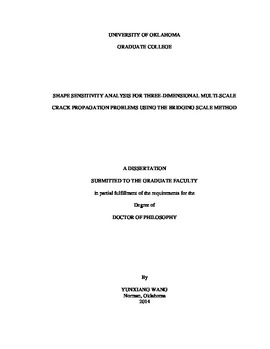| dc.contributor.advisor | Chang, Kuang-Hua | |
| dc.contributor.author | Wang, Yunxiang | |
| dc.date.accessioned | 2014-05-01T20:26:17Z | |
| dc.date.available | 2014-05-01T20:26:17Z | |
| dc.date.issued | 2014-05 | |
| dc.identifier.uri | https://hdl.handle.net/11244/10337 | |
| dc.description.abstract | During the past two decades, a variety of concurrent multi-scale simulation methods have been developed, such as the bridging scale method, in which MD simulation is performed only at localized areas of interest, while the response of rest of the domain is solved by using finite element method (FEM). This thesis presents a shape sensitivity analysis approach for multi-scale crack propagation problems based on the bridging scale method. The objective is to reveal the impact of macroscopic shape change on the speed of crack growth at microscopic level. Two major challenges exist in shape sensitivity analysis of coupled atomistic/continuum crack propagation problems, namely the discrete nature of the MD simulation and the non-differentiability of the performance measure of crack propagation speed. In this thesis, the shape sensitivity expressions are derived using direct differentiation method by taking material derivative of a continuum variational formulation of the bridging scale. To get around the discontinuity issue in continuum shape design due to the discrete nature of the MD simulation, the design velocity fields are defined in a way that the shape of the MD region does not change. The derived shape sensitivity formulation can be used to analytically compute the sensitivity coefficients of structural responses at the atomistic level. In addition, a performance measure that quantifies the speed of crack is established to support the sensitivity calculation for crack propagation speed. To overcome the non-differentiability of crack speed in design space, a hybrid method that combines analytical sensitivity analysis and regression analysis is developed. The proposed analytical sensitivity approach and hybrid method are implemented numerically in a nano-beam example, and the accuracy is verified using overall finite difference results.
The analytical sensitivity expressions in this thesis are formulated based on a rigorous mathematical foundation, and is generalized for three-dimensional structures with arbitrary geometric shape. In calculating the sensitivity of crack speed, the hybrid method with regression analysis is much more efficient than overall finite difference. The major contributions of this thesis are: first, it demonstrates the feasibility of shape design of coupled atomistic/continuum systems for the first time; and second, the proposed sensitivity approach accurately predicts the correlation between macroscopic shape change and microscopic crack propagation speed, and therefore establishes the foundation of multi-scale residual-life-based structural optimization without involving traditional fracture mechanics theory. | en_US |
| dc.language | en_US | en_US |
| dc.subject | Engineering, Mechanical. | en_US |
| dc.title | SHAPE SENSITIVITY ANALYSIS FOR THREE-DIMENSIONAL MULTI-SCALE CRACK PROPAGATION PROBLEMS USING THE BRIDGING SCALE METHOD | en_US |
| dc.contributor.committeeMember | Attar, Peter | |
| dc.contributor.committeeMember | Gramoll, Kurt | |
| dc.contributor.committeeMember | Muraleetharan, Kanthasamy | |
| dc.contributor.committeeMember | Vedula, Prakash | |
| dc.date.manuscript | 2014-04 | |
| dc.thesis.degree | Ph.D. | en_US |
| ou.group | College of Engineering::School of Aerospace and Mechanical Engineering | |
